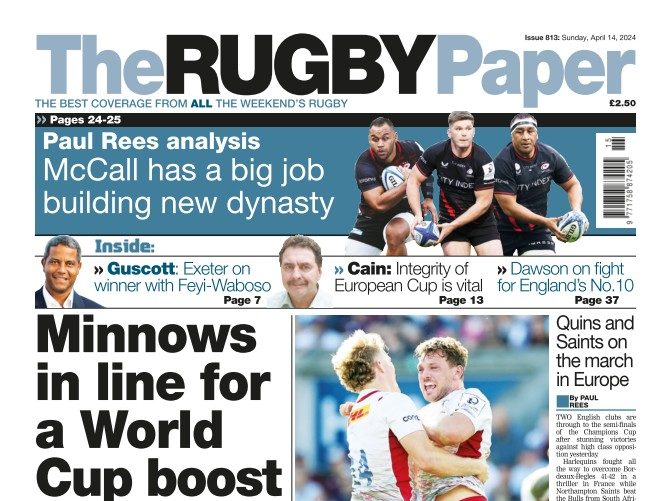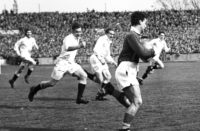One of the biggest drawbacks of Rugby Union's obsession with amateurism was that the Rugby World Cup was belatedly dragged kicking into this world 15-20 years later than should have been the case. And that slowed rugby's development worldwide with consequences that are still being felt.
How very different the rugby histories of Argentina, Romania, Fiji and Tonga – to name just four nations – might have been had Rugby Union got its act together decades earlier.
Ice hockey founded their World Championships back in 1920, football went global in 1930 with the first 13-team World Cup in Uruguay while FIBA had their basketball World Championship up and running by 1950. The World hockey Championships were introduced in 1971 and the inaugural World Cup cricket finals were an outstanding success in the long hot summer of 1975.
Not until 1987, however, did Rugby Union finally realise that the sporting world was disappearing into the far distance. Even marbles have had an annual global championships since 1932!
Of course, the thing about a Rugby World Cup, with all the TV monies and sponsorship it was bound to attract, is that it made professionalism inevitable which for decades was unthinkable for those in power.
A Rugby World Cup would also have involved the eight core members of the IRB running the risk of being defeated and embarrassed by minor teams – nations they had taken some trouble to exclude from their cosy club and the corridors of power.
It is difficult to fathom the mind-set of those involved and the kindest thing you can say is that they were of an era. The high priest of elitism/isolationism was probably Wavell Wakefield who once penned an infamous article in Touchdown, a magazine celebrating the centenary of the RFU in 1971 and an associated world congress. As a former captain of England, RFU president and an IRB board member, Wakefield was a fully paid-up member of the inner circle. Read this extract and weep:
There could even be a World Cup for Rugby though I, for one, hope it does not happen. The Rugby Union made it clear that the main object of its World Congress was to show how the game is played, and conducted, in England. That means an amateur game, played for recreation and enjoyment by people who spend the rest of the week at work.
A World Cup is quite enough of an ordeal for our soccer players whose living it is. For amateur rugby players it would introduce a much too demanding complication into their daily lives. If every country approached the game as we do it might be a different matter.
But these are days when sport is so often used as a vehicle for political propaganda. Rather than become involved in that kind of thing I would prefer to see our own rugby revert to its time honoured domestic format with as few commitments outside of the British Isles as possible.
The result of such self-serving elitism was catastrophic for developing rugby nations who not only had no voice but few Tests and no tournament to measure their progress and to promote the sport domestically. Some exceptional sides were badly stymied and the world of rugby was much the poorer.
Argentina 40-50 years ago were a major rugby nation waiting to happen. In 1968 they beat a strong Wales XV 9-5 in Buenos Aries and seven days later drew 9-9. Two years later they defeat Ireland 2-0 in a home series and yet again they were subtly insulted by it being deemed only an Ireland XV with caps not being awarded. Try telling Frank O'Driscoll – father of Brian – that Ireland weren't at full strength that day. He still fumes about it not having Test status.
In 1976 I watched Wales, sorry a Wales XV, sneak a lucky 20-19 win over the Pumas at the Arms Park and in case you doubt the strength of the Welsh XV that day let me enlighten you: JPR; Gerald Davies, Ray Gravell, Roy Bergiers, JJ Williams; Phil Bennett, Gareth Edwards; Graham Price, Bobby Windsor, Charlie Faulkner, Geoff Wheel, Barry Clegg, Trevor Evans, Terry Cobner and Derek Quinnell. That's a lot of legends but I can assure you such as Martin Sansot, Daniel Beccar Varela, Alejandro Travaglini, Hugo Porta, Adolfo Etchegaray and Jose Fernandez matched them all the way.
Had there been a World Cup any time between 1968 and the late Seventies Argentina would have been real contenders for a semi-final place at least. Even as late as 1982 they beat South Africa in a full Test at Bloemfontein. But those Argentinian sides had no chance to develop, nowhere to go, no say.
Think how rugby in Argentina could have taken a different trajectory if for example they had battled their way into a 1975 Rugby World Cup final. What a great promotional tool to use in their perennial battle for hearts and minds with the all-dominant football.
What about Tonga? In 1973 they rocked off down to Brisbane and scored four tries in beating Australia 16-8 but with other Test sides avoiding them like the plague, and no World Cup, Tongan rugby players would, in the future, start looking to Australia and New Zealand.
Think how that Fijian side of 1970 that trounced a British Lions-strength Barbarians, might have lit up a World Cup and given rugby among the Pacific Islands much more status and influence. But, of course, that was absolutely the last thing rugby's power brokers wanted.
Had there been a World Cup even four years earlier than the inaugural completion in 1987 you would have tipped Romania – who slayed Wales, Scotland and France around this time and went toe-to-toe with New Zealand in Bucharest – to have excelled.
A World Cup final spot would have cemented rugby's place in Romania's sporting culture and probably goaded other Eastern bloc countries into serious action. Rugby World Cup now is a terrific tournament, RWC2015 will be a huge success, but sometimes you can't help reflect on the road not taken.




























Pingback: Tankless Water Heater Installation Plumbers